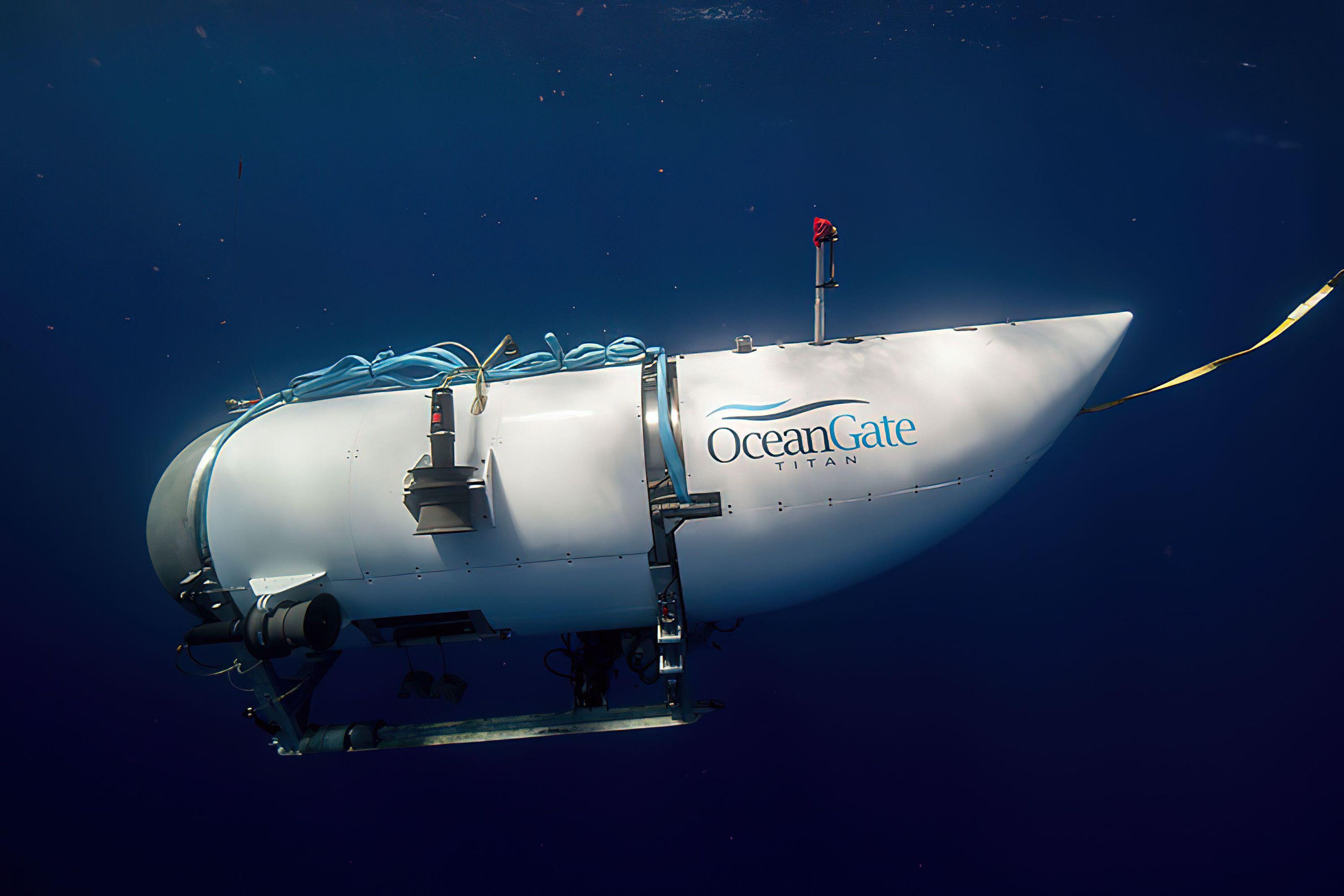Whistleblowers warned OceanGate safety issues could prove ‘catastrophic’. Then its Titanic sub imploded
A top employee raised safety concerns five years before the vessel’s catastrophic implosion
Your support helps us to tell the story
From reproductive rights to climate change to Big Tech, The Independent is on the ground when the story is developing. Whether it's investigating the financials of Elon Musk's pro-Trump PAC or producing our latest documentary, 'The A Word', which shines a light on the American women fighting for reproductive rights, we know how important it is to parse out the facts from the messaging.
At such a critical moment in US history, we need reporters on the ground. Your donation allows us to keep sending journalists to speak to both sides of the story.
The Independent is trusted by Americans across the entire political spectrum. And unlike many other quality news outlets, we choose not to lock Americans out of our reporting and analysis with paywalls. We believe quality journalism should be available to everyone, paid for by those who can afford it.
Your support makes all the difference.Safety concerns about the Titan submarine that imploded in the depths of the Atlantic Ocean with five people on board have been revealed in a number of scathing reports.
The US Coast Guard announced during a Thursday press conference that the missing Titan’s pressure chamber was found among other debris, approximately 1600 feet from the bow of the Titanic on the sea floor by an ROV. In a statement to The Independent, OceanGate — the private company that offers the $250,000-a-seat expedition to the wreck of the Titanic — confirmed that the five passengers aboard the vessel are now believed dead.
But before boarding submarines from OceanGate, travellers were warned in a contract that “it has not been approved or certified by any regulatory body, and could result in physical injury, disability, motion trauma, or death”.
The disclaimer is part of a long list of concerns regarding the company’s safety record, as its crew remains unaccounted for with air rapidly running out.
Follow the latest updates on the missing Titan submarine here.
A lawsuit, a letter from industry leaders, and comments from the company’s own CEO, one of the missing crewmen, all pointed to potential issues with the Titan submersible.
In 2018, the company fired David Lochridge, OceanGate’s director of marine operations. They claimed he breached his contract and shared confidential information about its designs with two individuals as well as with the Occupational Safety and Health Administration.
However, Mr Lochridge alleged in a wrongful termination suit obtained by The New Republic that he was fired for blowing the whistle about concerning safety issues.
According to the suit, Mr Lochridge delivered highly critical updates regarding the ship’s quality control to senior management and OceanGate CEO Stockton Rush, pointing to alleged issues such as “visible flaws” in the ship’s carbon fibre hull, “prevalent flaws” in a scale model, flammable materials onboard, a viewing window not rated for the Titanic’s depth, and key safety documents that were not shared with him.
“Now is the time to properly address items that may pose a safety risk to personnel,” he allegedly said at one point. “Verbal communication of the key items I have addressed in my attached document have been dismissed on several occasions, so I feel now I must make this report so there is an official record in place.”
The official allegedly pushed for further testing and for outside evaluators like the American Bureau of Shipping to inspect and certify the submarine.

He claimed, according to filings obtained by the magazine, that he was fired when he said he wouldn’t authorise manned testing of the sub without scans of the craft’s hull.
The Independent has contacted OceanGate for comment.
An attorney for Mr Lochridge, who settled with the company in 2018, said the man has no comment and that “we pray for everyone’s safe return”.
That wasn’t the only red flag about the company, which became a media darling for its bold claims about innovating submarine design and bringing tourists to see the famed North Atlantic wreck.
In 2018, leaders in the submarine industry wrote a letter from the Marine Technology Society to the company warning of “catastrophic” issues with the submarine’s development.
Three dozen signatories including executives, oceanographers, and explorers expressed “unanimous concern”, particularly with the company’s decision not to seek outside evaluation and testing.
“While this may demand additional time and expense,” the signatories wrote in the letter, which was obtained by The New York Times. “It is our unanimous view that this validation process by a third party is a critical component in the safeguards that protect all submersible occupants.”

In a 2019 blog post, the company defended its decision not to have its sub “classed” by an outside evaluator.
“The vast majority of marine (and aviation) accidents are a result of operator error, not mechanical failure,” it reads. “As a result, simply focusing on classing the vessel does not address the operational risks. Maintaining high-level operational safety requires constant, committed effort and a focused corporate culture – two things that OceanGate takes very seriously and that are not assessed during classification.”
That same year, Mr Rush, the CEO, told Smithsonian Magazine that submarine regulations were stifling innovation.
“There hasn’t been an injury in the commercial sub industry in over 35 years. It’s obscenely safe, because they have all these regulations,” he said. “But it also hasn’t innovated or grown – because they have all these regulations.”
The alleged issues didn’t end there.
In 2020, the CEO told GeekWire the hull of the submarine was showing signs of “cyclic fatigue”, one of the same technical issues Mr Lochridge allegedly warned about, as the company continued to test the craft, including with a 4,000m deep dive in the Bahamas.
As a result, the company temporarily downgraded the Titanic submarine’s hull depth rating to 3,000m, 1,000 less than the Titanic’s depth, according to TechCrunch.
Over the next two years, according to the publication, the submarine’s hull, originally built by Spencer Composties, was repaired or rebuilt by aerospace contractors Electroimpact and Janicki Industries.
The Independent has contacted all three companies for comment.
Electroimpact did not answer specific questions about its reported involvement with the submarine, but company chief operating officer Austin Clark told The Independent via email that“our thoughts and prayers go out to the passengers and their families”.
Spencer told TechCrunch its hull wasn’t used on the version of the Titan which went down to the Titanic and went missing.
By 2021, the submarine had completed its first trip down to the Titanic.
As OceanGate continued to plunge into its Titanic mission, problems continued.
A 2022 mission saw the Titan suffer battery issues that required the ship to be manually attached to a key lifting platform, according to court documents obtained by The New York Times.
Last year, on a visit to the Titanic programme, a CBS News reporter observed the submarine allegedly had “off the shelf components” including lights from Camping World, and that the submarine suffered a communications issue with the ship overseeing its voyage and was lost for nearly three hours underwater.
OceanGate Expeditions founder and CEO Stockton Rush, British billionaire Hamish Harding, renowned French diver Paul-Henri Nargeolet, Pakistani businessman Shahzada Dawood and his 19-year-old son Suleman were on board the Titan. All five passengers are presumed dead following the discovery of debris on Thursday.
The Coast Guard says that ROVs will remain in place but that it will begin to pull back equipment over the next 48 hours.
“This is an incredibly unforgiving environment out there on the sea floor. The debris is consistent with the catastrophic implosion of the vessel. We will continue to work and search the area down there but I don’t have an answer on prospects at this time,” said Rear Admiral John Mauger of the US Coast Guard.
The Rear Admiral said that sonar buoys had been in the water for the past 72 hours and that they had not picked up any evidence of an implosion, suggesting that it had happened early on in the dive.



Join our commenting forum
Join thought-provoking conversations, follow other Independent readers and see their replies
Comments